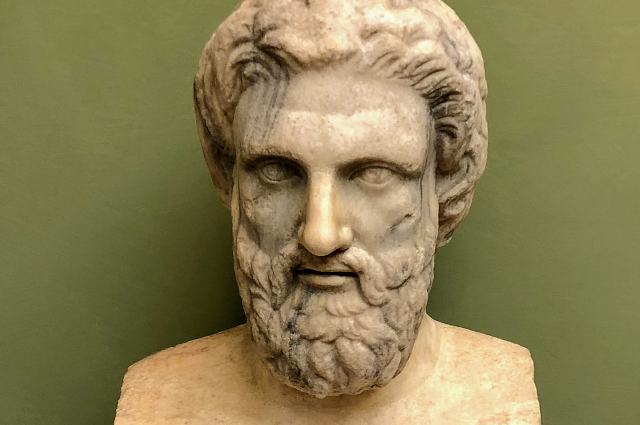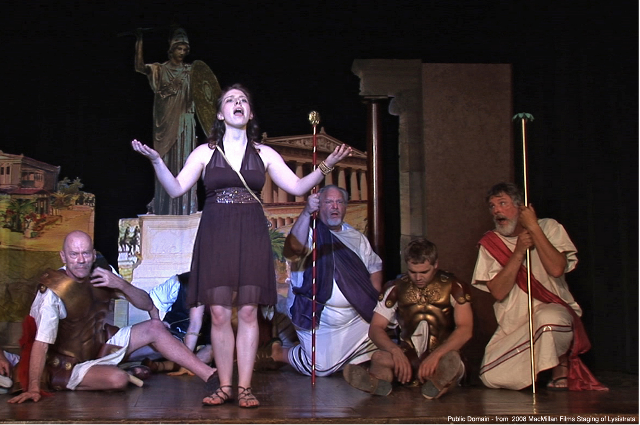
Image by wikipedia
Aristophanes was probably the first accidental feministic philosopher and Lysistrata— the first female feminist. While truly being unbeknownst of it. Because I think, it perhaps is the truth, that slightly must had drifted across the mind of most literary readers ( specifically Greek ones ). As it’s really astounding to perceive that he composed a play in 411 BCE and performed for the first time nearly 2400 years ago, that seems to be the ushering foundation of idea finding it’s true identification and meaning in new age world as feminism under the parent institution of equality. For the play extensively put forth the scenario and give a glimpse of gender roles of both men and women in the society of ancient Greek. While showcasing the approach of women for the free will and rights in the society that appears to be patriarchal in nature. And have a predefined notions for both the men and the women. Aristophanes does this through displaying a sheer sense of satire and humor wrapping in itself the objectives of truth, and presenting the alternative reality which women were oblivious to , where they too have the freedom of choice and demand.
There is a even wider spectrum to both aspects upon close examination. Such as Gender roles in the play where Aristophanes with combination of brashness and simplicity for which he was acclaimed for presents the titular character of Lysistrata, who summons up all the women of Greece and formulated a plan to bring peace between the states of Athens and Sparta by ending the long going Peloponnesian War through mainly two schemes by seizing Acropolis which is the financial reserve of Athens to put the stoppage on the financial supply chain and secondly which appeared to be more prominent than the former, which is by asking women’s to withhold or denial to have sex with their husband until they come to an agreement of peace with the oppositional state. To make things even more tense and hasty, Lysistrata suggests women to wear their “lawn shifts and nothing else and plucked down below delta-style ” her idea is to make them wear their most beautiful clothes and groom themselves in order to drive their husband mad with sexual desire, with the goal of forcing them to end the war quickly.
In the play, Aristophanes makes reader aware of the rigid gender role of women and men in classical ancient Greece.
For instance Calonice ( one of the neighbor of Lysistrata ) says “ they will come, darling. For women to get out of the house is quite some trouble, you know. One of us may be hanging round her husband her husband, another rousing a servant, another putting her baby to bed or bathing it or feeding it with titbits.” Which shows the perception of inflexible role of women as of care takers and mere managers of household chores and as of a reproduction machines in the ancient society of Greece. Also at another instance Calonice mentions “ but what can women achieve that is clever or glorious ,we who sit at home all dolled up, wearing saffron gowns and cosmetics and cimberic straight-liners and riverboat slippers”
Which bring forward the personage of women which is meek, bound to duties, passive and the idea of suppression and limitations women put upon themselves due to the prolonged form of definite expectations which are expected from them by the patriarchal society. Where she is just perceived as the sexual desire of a man who is also bound to transform it into assault and marital rape if denied. As Calonice says “ what if they take us and drag us to bedroom by force” And how men on the contrary are expected to dominant, aggressive and defenders of their country, head of the family and considered to have definite control over women.
Magistrate getting shocked and referring the claim of Lysistrata to save the men and Athena from strife and various instances of him threatening to beat and crush down the women at Acropolis, shows the radical and governing behavior of men towards the women and how low expectations they have from them in aspects other than household duties. Due to this
Aristophanes strived to break the immutable gender roles which were pre determined, obstinate and were broadly prevalent the ancient Greek society by introducing the revolutionary character in form of Lysistrata who goes on to challenge these norms by taking up the stand for herself and emerging as a true women leader who persuades every women to destroy the shackles that bound them and use their wiles and sex as their weapon to subjugate the war and exhibit the true sense of gallantry and cleverness by effectively plotting the schemes, courageously withstanding the adversity which came in the form of magistrate and old men’s chorus while giving them essence of what women actually ate capable of, from managing the money to strategizing government through the metaphor of spinning wool while succeeding at their mission. Hence crushing out the traditional view which perceived women as inferior and incapable of making important decisions.
In contrast, the men in the play are portrayed as weak and impotent in the face of the women’s actions. They are unable to resist the women’s sexual strike and are ultimately forced to concede to their demands for peace. This challenges the traditional view of men as powerful and in control.
And now all of this is most proficiently showcased by Aristophanes with the help of humour, since Lysistrata is regarded as comedic play. Using the mastery of irony, satire to unveil the bitter truth in front of the audience in the engaging manner, as it ridicule the customs and long drawn beliefs of society.
One of the primary ways that Aristophanes uses humour in the play is through the characters. The men and women in the play are of inflated stereotypes, and their actions and dialogue of the characters often are seemingly absurd and ridiculous to a certain limit that can take us to the verge of laughing at their sheer eccentricity. For example, “ they’ve given us a bath out of those pitchers, that too without a soap, so that we can shake water out of our cloaks as though we’d peed un them.” Also the men’s obsession with war and their inability to control their sexual desires are satirized, as are the women’s seemingly sudden and dramatic shift from obedient wives to rebellious activists.
Another impressive display of humour to keep the audiences laughing at their seats is the constant nagging and fighting between old men’s chorus And old women’s chorus in a manner that feels very childish with the dialogues of undermining and of physically hurting each other in the most creative and painful sense. For instance “all right, here you are; someone hit it; I’ll stand still and take it— and then no other bitch will seize your bollocks again”
“I’ll tear out your lungs and your guts with my teeth!”
Humour is also used in the language and wordplay. Aristophanes uses puns, double entendres, and other linguistic devices to create comic situations and dialogue. As the name “Lysistrata” itself is a pun, meaning “disbander of armies.” While there are various usage of double meaning dialogues in play which refers mostly to sexual attributes since it’s a topic that is mostly considered taboo and garners the lot of shyness and comedic reactions. For instance “ is that why you’ve come here with a spear hidden in your clothes” ( kinesis, pg 117 ) referring to bulge due to erected penis.
Aristophanes also intelligently creates the comic situations like that of myrrhine and kinesis where she tries to beguile her husband to the apogee of seduction and then silently leaving him midway. While most of the serious and intense moments are also made light hearted through the use of comedy such as the scene of reconciliation where both the delegates from each side are standing beside Lysistrata and amongst such gravity of situation, Athenian delegate passes comment on Lysistrata saying “ that is a beautiful bum”
The physical comedy is also present in the play. There are many instances of slapstick humour and physical gags, such as when the women block the entrance to the Acropolis and the men try to force their way through. Men undressing themselves so casually and usages of erect phallus on their body.
Overall, Lysistrata is a wonderful example of an ancient Greek work with ephemeral themes of women’s rights, unity, and the impact of war on society. While highlighting the limitations and absurdities of steadfast gender roles and their effect on people, while using Humour to convey the play’s underlying message. By presenting serious issues in a comedic way, Aristophanes is able to criticize and challenge the prevailing views and attitudes of the time. Through humour, he can address sensitive topics like war, gender roles, and politics, without offending or alienating the audience. While Aristophanes suggesting that there should be no inequality in terms of genders and one should not be compared any way less than the other.
Making him certainly the first accidental feministic philosopher.
. . .
Works Cited:
- Aristophanes, (tr. Sommerstein Alan H.), Lysistrata, printed in India, worldview publication, 1990, print.

